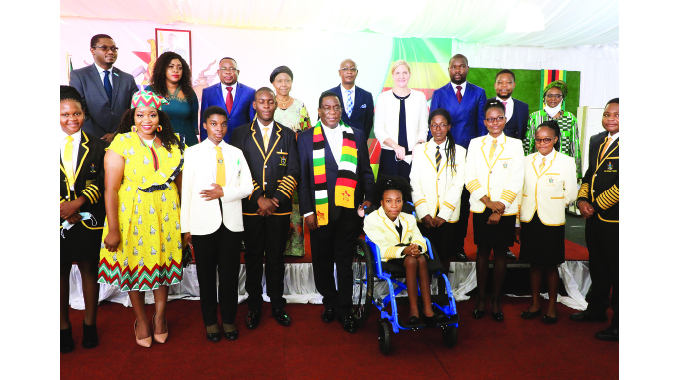Source: Learners want issues of ICTs, drugs addressed | The Herald
Elita Chikwati Senior Reporter
The increase in cases of child marriages, drug abuse by youths, lack of information communication technology gadgets to assist in e-learning and cyber-bullying, are some of the issues that learners across the country are concerned with.
This came out during the launch of the 29th Session of the Junior Parliament at State House yesterday, with some learners saying they were being denied platforms to showcase their talents.
Others spoke about the need to cut the distance walked by learners as they go to school, saying some of the distances were too long resulting in some learners dropping out of school, while others came from poor families that struggle to raise schools fees.
Junior President Miss Hazel Mandaza said drug abuse was rampant among youths but praised the Government for setting up an Inter-Ministerial Taskforce to address drug and substance abuse among youths.
“The taskforce should resourced,” she said.
“There is also need for compulsory vocational training for idle youths to curb drug abuse.”
Harare South Constituency Junior legislator Vanessa Musika, also said there was need for e-learning tools.
“We are in a digital world but some of the Junior Members of Parliament do not have phones. We also need data. We don’t have e-learning tools. The issue of the high charges of data is also of concern.
“There is the issue of accessibility, affordability and availability of connectivity. This is as important as the supply of electricity. Without electricity we can’t access online lessons,” she said in a speech read on her behalf by junior legislator, Wesley Dhliwayo.
Another junior legislator, Christabel Dube, expressed concern over high numbers of school dropouts in the Midlands Province, saying parents’ lack for funds caused that, especially in Kwekwe and Gweru.
“Early marriages are increasing because parents cannot afford schools fees. We should focus on educating our youths on the dangers of early marriages,” she said.
She also called for bursaries so that the vulnerable children can have access to quality education.
Honourable Dube also raised concern about overcrowding of students in classes at schools in the Midlands.
She appealed for more recreational facilities to enable learners to relax after a busy day at school.
Responding to the concerns raised by the learners, acting Primary and Secondary Education Minister, Professor Paul Mavima said Cabinet had approved a programme for the construction of 3 000 schools starting first quarter of 2022 to ensure more schools were available across the country to cut distances that learners walk to the nearest school.
“Resources have already been allocated for the construction of 20 boarding schools.
“On e-learning, the Ministry of ICT has taken a more aggressive stance to provide gadgets. Government has established a local factory in a joint venture with a Chinese company. The President has also been pushing for Presidential Computerisation Policy for schools.
“The Ministry of ICT is pushing to connect many schools and a programme to provide base stations to help children in remote areas engage in e-learning is underway,” he said.
Minister Mavima said the Basic Education Assistance Module (BEAM) had also seen the number of children benefiting rising from 750 000 learners to 1,5 million starting next year, to ensure all children have access to education.
Turning to drug abuse, Minister Mavima said from next year, there will be many activities aimed at curbing drug abuse, including advocacy and law enforcement.
“Facilities for rehabilitation of those affected by drugs will also be set up,” he said.
Justice and Parliamentary Affairs Minister Ziyambi Ziyambi said there will be input of learners on Bills that are still in Parliament.
“We will have some teams going to schools so that we will be able to appreciate the issues that they want included in these particular Bills. The Bills are dealing specifically with interests of our children.
“Our Constitution involves all of us to make sure that we act in the best interests of children. We are bringing this Bill that will deal with some of the issues that you have been raising; child marriage, sexual abuse and how children who come into contact with the law are supposed to be dealt with.
“I believe that in 2022, teams will come and deliberate with you so that we incorporate your input in these Bills,” said Minister Ziyambi.
Child marriages are now being criminalised and Government is in the process of looking at the criminal courts to ensure a review of sexual offences.
Minister Ziyambi said Finance and Economic Development Minister Professor Mthuli Ncube had pledged to ensure youth-led initiatives were to be sponsored by the fiscus and have tax incentives to companies that employ youths.
Youth, Sport, Arts and Recreation Minister Dr Kirsty Coventry said the Junior Parliament gives a platform for children to share their concerns hence her ministry would ensure that they be addressed.
“Children are being capacitated to demand their rights therefore everyone in authority should take them seriously,” she said.
“An Africa, fit for children entails responsible young children as well.
“I urge you to use the resources availed to you for the benefit of those who will come after you.
“We are also looking forward to the Youth Act that will be all embracing and that will be supported by an act of Parliament.”
Newer Post
Fight against child abuse moves gear up Older Post
CSC loses 95 cattle 
COMMENTS